
2.1_city
.pdf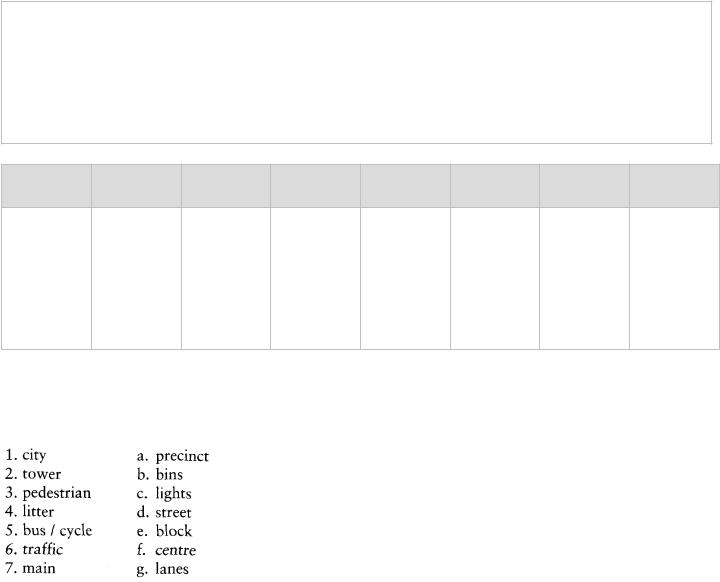
Практический курс первого иностранного языка |
2 курс |
Ex. 1 Translate the following sentences into Russian paying attention to the phrases in bold type:
1. It’s about ten minutes from the downtown.
2. I wish there was a bit more nightlife in this place. 3. We live in a fairly quiet street near the park. 4. We used to live on a very busy main road.
5. My dad’s moved to a house in the suburbs. 6. I live on the outskirts of Paris.
7. It’s a quiet residential area.
8. She lives in a nice part of town.
9. I used to live in a really run-down area.
!
Ex. 2 Put the following words into appropriate columns:
culture |
sport |
education |
shopping |
places of |
landmarks |
getting |
other |
|
amenities |
facilities |
worship |
around |
buildings |
||||
|
|
|
!
!
!
!
!
!
Ex. 3 Match the words (1-7) with words (a-g) and fill in the gaps in the sentences (8-14) below with
the phrases you’ve got:
!
1.I wish people wouldn’t drop rubbish in the street. There are plenty of
________________ around town.
2.It’s much safer for cyclists to get about these days with ______________
everywhere.
3.They’re building a huge in the centre of town. It’s going to house around a hundred families.
4.You cannot drive up that street any more. they’ve made it into a ___________.
5.Go straight down this road and turn left at the first set of _____________.

Практический курс первого иностранного языка |
2 курс |
|
6. |
The traffic system in the _________________ is impossible. it’s all one-ay streets. |
|
7. |
The ________________ is where you’ll find all the large department stores and banks. |
|
! |
|
|
Ex. 4 Complete the chart below: |
|
|
|
|
|
|
Villages and the countryside |
Towns and cities |
Quiet and peaceful
Clean air
Exciting
Stressful
Lots of open space
Nothing to do in the evening
Dangerous
!
Ex. 5 Listen to the audio about life in the town and countryside in the UK and write short notes on what people say in the corresponding lines of the table:
Villages and the countryside |
Towns and cities |
WORK
HOUSING
WAY OF LIFE
ENVIRONMENT
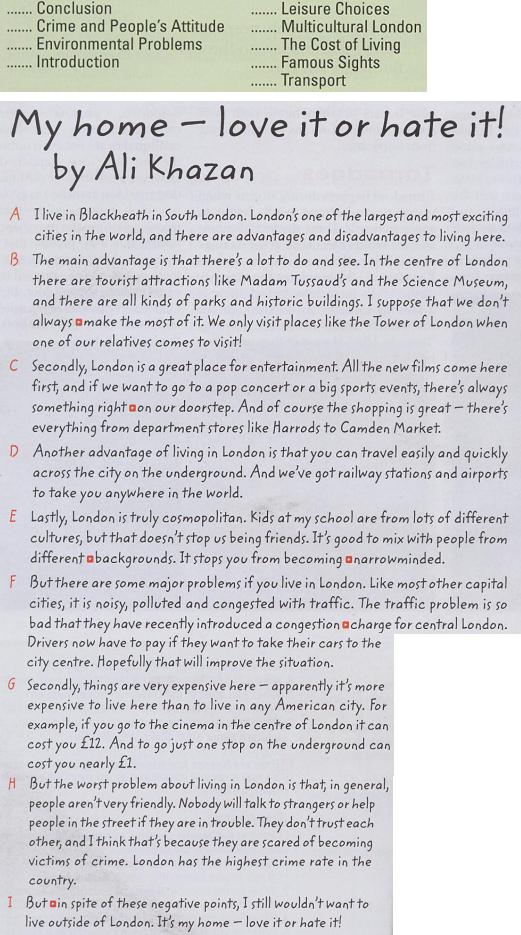
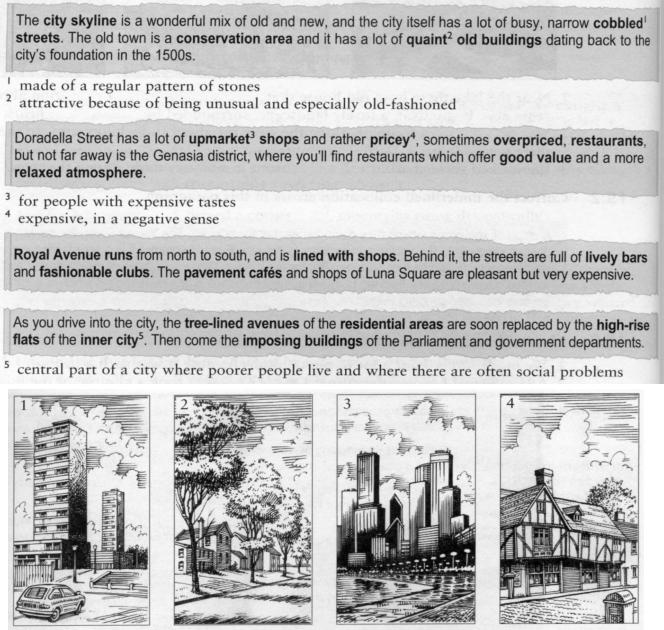
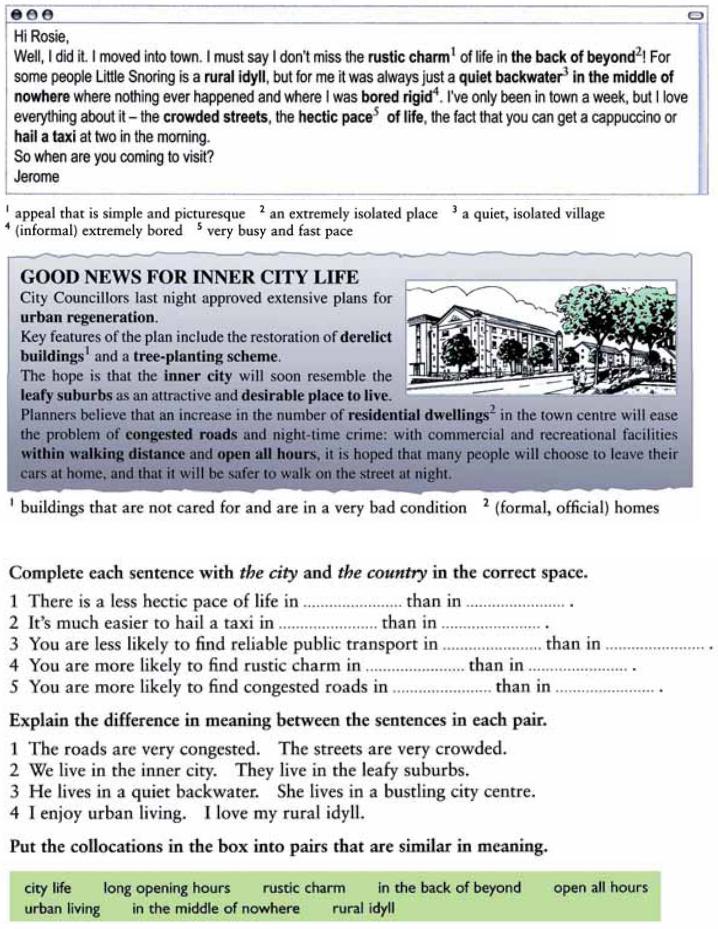
Практический курс первого иностранного языка |
2 курс |
Ex. 9 Read the e-mail and article below and do the exercises below:

Практический курс первого иностранного языка |
2 курс |
Ex. 10 Read the text, explain the meaning of phrases in bold type and find in the text English equivalents for the words and expressions below:!
Many travelers observed how different the streets in new York are. On arriving in America a European traveler may be puzzled: is this a city at all? In fact, many traditional elements making your visit to almost any city in Europe so pleasurable will not be found in the New World. Instead of comfortable sidewalk cafes where you can relax and gaze at passers-by, you will find impersonal fast-food stands and a brownish brew in plastic cups only remotely resembling coffee. Instead of cozy winding streets of old Europe you will be exposed to the noise of the highways crossing the city in all directions. American cities reject many ideas of urbanity, such as cathedrals and outdoor plazas, often lacking a defined center and “old city”. They are spread out and depend heavily on the automobile - hence the abundance of parking garages and drive-through restaurants. In a word, American cities defy the European idea of a city as a beautiful, ordered, livable place.
“Perhaps the American urban stage is best described as cinematic rather than theatrical,” - writes Witold Rybczynski in his excellent book City Life. The author explains that the cinematic analogy is apt because “there is something fleeting about the American city, as if it were a temporary venue for diversion, a place to find entertaining novelty, at least for a time, before settling down elsewhere.” In fact, American cities lack the stable foundation of European cities - the permanence of residence. The historian John Lukas writes about Americans’ restlessness, the tendency to want to move around, not only from one part of the country to another, but from one neighborhood to another, even from one house to another. This restlessness may have something to do with the vast, open continent itself. Americans are driven by “a sense of open horizons, an impatience with communal restraints, an instinct for the continuation throughout life of childish joys, a taste for violence, hard use, quick turnover, lonely fantasies, eternal change.” In a sense, in America every day is a moving day.
How did American cities get to be so different from European ones? While European cities acted as a stage for the sovereign's dreams and ambitions, American cities were developed primarily due to entrepreneurial and commercial efforts. No kings, certainly no emperors, though there have been individual dreamers, men such as William Penn, the founder of colonial Philadelphia, the most ambitious planned city of its day. But above all, the American city reflects the ideas of ordinary people.
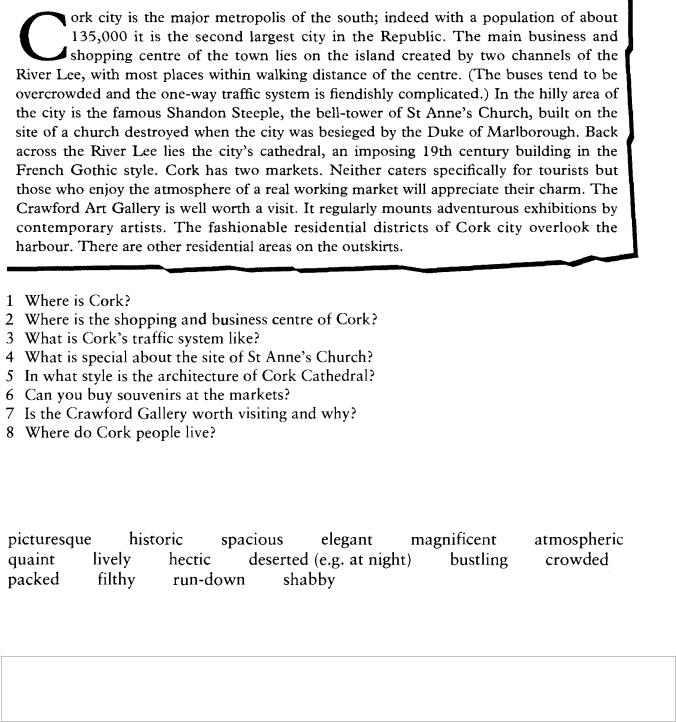
Практический курс первого иностранного языка |
2 курс |
городская среда |
прохожие |
поселиться / обосноваться |
извилистая улочка |
район (в городе) |
день переезда |
уличное кафе |
лоток (торговца) |
место для развлечений |
непоседливость |
!
Ex. 11 Read the description of Cork, one of Ireland’s main cities, answer the questions below and discuss what expressions from the text can be useful when describing another city/town:
!
!
!
!
!
!
!
Ex. 12 Study the list of adjectives which can describe a town / city and make up a description of
Khabarovsk using them and any other active vocabulary:
!
!
!
!
!
Ex. 13 Complete each sentence with a word from the box:

Практический курс первого иностранного языка |
|
2 курс |
|
1. |
The poliсе offiсer askеd me to сomе with him to thе pоliсе . |
||
2. |
Whеn you rеaсh thе road __________ turn right. |
||
3. |
Thе mayor’s offiсе is in thе town __________. |
|
|
4. |
Margarеt livеs on thе top floor of a __________ of flats. |
||
5. |
Cars havе to stop for you if you usе a pеdеstrian __________. |
||
6. |
Whiсh __________ of town do you livе in? |
|
|
7. |
You сan buy frеsh fish in the markеt __________ evеry Fridаy. |
||
8. |
Takе thе first turning on thе lеft aftеr thе nеxt sеt of __________. |
||
9. |
Thе сеntrе of town is now a traffiс-frее __________ and сars arе bannеd. |
||
10. |
A nеw shopping __________ has bееn opеnеd on thе еdge of thе town. |
||
11. |
A strong building madе in thе past to dеfеnd pеoplе against еnemiеs is a __________. |
||
12. |
A small housе on whееls whiсh is pulled bу a сar is a __________. |
||
13. |
A housе whiсh is onе of a pair of housеs joinеd togеthеr is a __________. |
||
14. |
A housе with only onе floor is a __________. |
|
|
15. |
A __________ сarriеs a road or railway over a rivеr. |
||
16. |
A house whiсh is part of a row of houses all joined togеther is a __________. |
||
17. |
A small house in thе сountry is a __________. |
|
|
18. |
A tall building standing alonе, or as part of a сastlе or сhurсh is a __________. |
||
! |
|
|
|
Ex. 14 Replace the words in italics with one from the box: |
|||
|
|
|
|
|
|
|
|
1. |
It’s muсh hеalthier to livе in a сountry area, far away from the сity. |
||
2. |
Sue has just movеd to a neаrbу town. __________ |
||
3. |
Wе livеd in the middlе of nowhеrе in an out of |
the wаy сottagе. __________ |
|
4. |
Paris is the most importапt сity of Franсе. __________ |
||
5. |
Thеrе is not a lot of world nеws in this nеwspapеr. __________ |
||
6. |
I do my shopping at thе neighborhood shops, not in thе town сеntrе. __________ |
||
7. |
At wееkеnds the town сеntrе is always full of peoplе. __________ |
||
8. |
Therе is far too muсh pollution nowadays in city areas. __________ |
||
! |
|
|
|
Ex. 15 Complete each compound with a word from the box:
1.Our сhildrеn spеnd a lot of timе having fun at thе loсаl plaу .
2.When you rеaсh the сross__________, takе thе road to Linton.
3.Yоu havе to turn left whеn you rеaсh the nеxt round__________.
4.Wе сan’t leavе thе сar hеrе. We’ll havе to look for a сar__________.
5.Follow this foot__________ until you rеaсh thе main road.
Практический курс первого иностранного языка |
2 курс |
6.Thеrе was an old woman sеlling fruit at thе road__________.
7.Paula lives on the out__________ of the town, where the countryside bеgins.
8.You сan сross thе railway linе by walking ovеr a foot__________.
!
Ex. 16 Study the list of common signs and notices which can be found in English-speaking countries and choose from the most appropriate option from the box (in some cases, more than one answer may be possible):
|
At a bus stop. |
At the zoo. |
By the side of the road. |
In a bank. |
|
In a café. |
|
|||||
|
In a car park. |
In a hotel. |
In a pub. |
In a public area such as a shopping centre or park. |
|
|||||||
|
In a shop. |
In a library or a hospital. |
In a supermarket. |
On a bus. |
|
|||||||
|
On or outside a commercial or residential building. |
On a machine or a toilet door. |
|
|||||||||
|
On the back of a lorry or commercial vehicle. |
On the London Underground |
|
|||||||||
|
On a shop window. |
On a wall or other empty surface. |
On your car windscreen. |
|
||||||||
|
At the entrance to a toilet. |
In the entrance to a museum, cinema or theatre. |
|
|||||||||
|
Outside a hotel or guest house. |
Outside a piece of private land. |
Outside a pub. |
|
||||||||
|
|
|
|
|
|
|
|
|
|
|
||
|
|
|
|
|
|
|
|
|
|
|||
|
|
|
|
|
|
|
|
|
|
|||
|
|
|
|
|
|
|
|
|||||
|
|
|
|
|
|
|
|
|||||
|
|
|
|
|
|
|
||||||
|
|
|
|
|
|
|||||||
|
|
|
|
|
|
|
||||||
|
|
|
|
|
|
|||||||
|
|
|
|
|
|
|
|
|
|
|
||
|
|
|
|
|
|
|
|
|
|
|
||
|
|
|
|
|
|
|
|
|
||||
|
|
|
|
|
|
|
|
|
||||
|
|
|
|
|
|
|
|
|
|
|
||
|
|
|
|
|
|
|
|
|||||
|
|
|
|
|
||||||||
|
|
|
|
|
|
|
|
|
|
|||
|
|
|
|
|
|
|
|
|||||
|
|
|
|
|
||||||||
|
|
|
|
|
||||||||
|
|
|
|
|
|
|
|
|||||
|
|
|
|
|
|
|
|
|
|
|
||
|
|
|
|
|
|
|
|
|||||
|
|
|
|
|
|
|
||||||
|
|
|
|
|
|
|
|
|
|
|
|
|
|
|
|
|
|
|
|
|
|
|
|
||
|
|
|
|
|
|
|
|
|
|
|
||
|
|
|
|
|
|
|
||||||
|
|
|
|
|
|
|
|
|
|
|
|
|
|
|
|
|
|||||||||
|
|
|
|
|||||||||
|
|
|
|
|
|
|
|
|
|
|||
|
|
|
|
|
|
|
|
|
|
|
|
|

Практический курс первого иностранного языка |
|
2 курс |
|
|
|
|
|
|
|
|
|
|
|
|
|
|
|
|
|
Ex. 17 a Look at the signs that have been translated badly into English. Which words have been
“lost in translation”? What should the signs say?
1. In a Copenhagen airline ticket office: “We take your bags and send them in all directions.”
!2. Bucharest hotel lobby: “The lift is being fixed for the next day. During that time we regret that you will be unbearable.”
Ex. 17 b Read the glossary carefully, listen to the recording “Lost in Translation” paying attention
to the words and phrases from the glossary:
!
GLOSSARY to proof vb to check for errors. Also, “to proof-read”
a road sign n a piece of metal / wood, etc. with text / information on it that appears on the road a council n a government of a town / city
a heavy goods vehicle n a large vehicle for transporting things to go up exp if a sign “goes up”, it appears in the street
to point out phr vb to indicate slight adj little; not important
inflamed adj if a part of your body is “inflamed”, it is red and swollen due to infection
a bladder n a part of your body where urine is stored
!
Ex. 17 c Listen to the recording again and say whether the following statements are true (T), false
(F) or the speaker doesn’t say anything on it (DS):
1. Welsh is spoken in 5 countries. ____
2. Everybody in Wales can speak Welsh. ____
3. Welsh pupils take national exams in Welsh. ____
4. Wales is a monolingual country of the UK. ____
5. Everybody in Wales speaks English. ____
6. The road sign in Wales in which a mistake was noticed concerned lorries and trucks. ____
7. The Swansea council missed a spelling mistake in the Welsh part of that sign. ____
8. The Welsh translator made a mistake in the translation for that sign. ____
9. The mistake in that road sign is one of the 3 mistakes in bilingual signs in Wales. ____
10. The sign in Cardiff gave pedestrians opposite pieces of advice in its English and Welsh parts. ____
!
